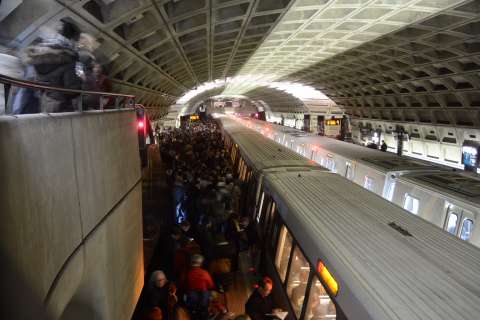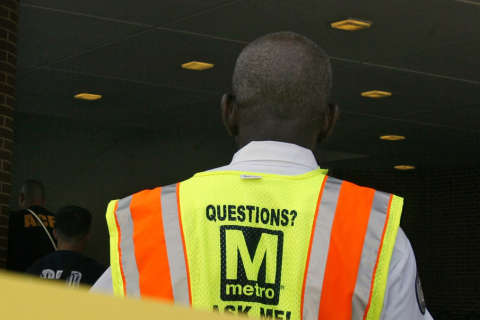WASHINGTON — Metro’s general manager called on transit workers to accept overtime assignments and he threatened to bring in contractors to do the work if members of the agency’s largest union turn down extra shifts.
General Manager Paul Wiedefled sent an internal memo Monday morning in response to the Amalgamated Transit Union Local 689, which suggested over the weekend that workers should no longer work overtime in response to Metro efforts to cut down on the number employees working seven days in a row.
The memo described robocalls tied to the union as “threatening a potentially unlawful and disruptive action of encouraging employees to turn down overtime.”
“At a very practical level, the use of overtime is a common management tool in the transit industry that provides scheduling flexibility, helps cover the unexpected and allows us to perform a lot of our critical safety maintenance night work. From a customer standpoint, we use overtime to add frequency for services and manage crowding,” Wiedefeld said.
ATU Local 689 said Metro only worries about safety policies “when it suits them.”
“Most recently, Metro disregarded the fatigue policy when it forced all Metro workers to work on inauguration weekend without regard to it being their seventh day of work. Even those who did not volunteer to work overtime were required to work, regardless of how it would affect their family or personal needs,” Local 689 spokesman David Stephen said in an emailed statement.
The union argues Metro should hire more workers to avoid needing to pay for overtime.
Wiedefeld’s bid to reduce the amount of overtime Metro employees work has fueled rising tensions between the region’s transit agency and its largest union amid ongoing contract talks.
Wiedefled promised to cut down on overtime to help close a budget hole. Metro also filed a lawsuit Friday in an effort to overturn labor rules that have been upheld by arbitrators.
“If the members of Local 689 choose to no longer sign up for voluntary overtime it is not illegal and it is wrong for the general manager to imply otherwise,” Stephen’s statement said. “Our members make the sacrifices of working seven days because they understand how essential reliable transit is to our riders, but they will not be disrespected while volunteering to make up for Metro’s lack of real leadership.”
Metro had an anti-fatigue management policy with Local 689 that functions alongside the existing union contract.
But Metro argued in a court filing that the existing rules, as upheld by arbitrators, do not give the agency enough flexibility because workers have a say in what if any overtime they work and employees with more seniority get the first chance to pick up extra shifts. Workers earn double time on the seventh day.
“Limiting hours of service for employees in safety-critical positions is a well-established transportation industry practice,” Wiedefeld said in the memo.
He threatened to transfer work to contractors, something Metro has already been doing at an increasing rate.
“In response to the threatened labor action by Local 689, I must keep every option on the table including using outside contractors and possible legal action. It is my sincere hope that every employee will continue to accept work assignments as they normally do,” Wiedefeld said.
The union statement said Wiedefeld “should be honest and tell the public that this court case is being brought to deny workers their fair and negotiated pay, it is not about safety.”







